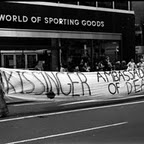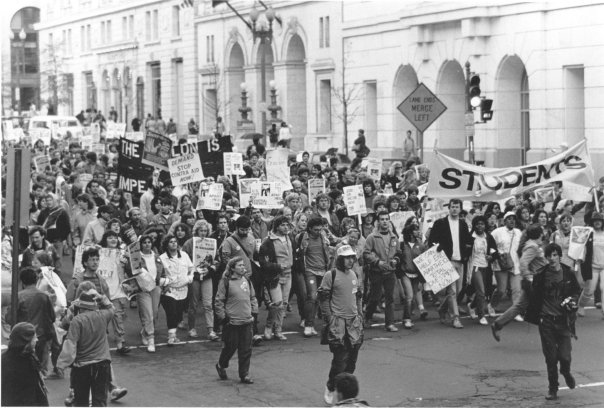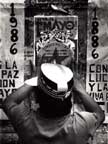In 1988 The Center for Constitutional Rights filed a lawsuit on behalf of CISPES against the Federal Bureau of Investigation concerning the agency’s multi-year campaign of harassment and surveillance aimed at anti-intervention, solidarity, and sanctuary activists. Subsequent Congressional hearings revealed the extent to FBI activities, and ultimately lead to restrictions on the conduct of FBI agents.
The thousands of pages of files also showed that the FBI, to justify its actions, accepted as fact a right-wing conspiratorial world-view which saw dissent as treason and resistance to oppression as terrorism.
read an extended article here

 The Bay Area CISPES chapter had radically politicized a core of 3000-4000 activists in a San Francisco ballot initiative. During the drive for the ballot initiative, Henry Kissinger was speaking at the San Francisco Hilton, and CISPES organized their thousands of democrat-identified ballot activists to attend. Riot police surrounded and corralled the protest, blatantly attacking the demonstrators. This served to radicalize all of those activists, who San Francisco CISPES continued to incorporate and organize.
The Bay Area CISPES chapter had radically politicized a core of 3000-4000 activists in a San Francisco ballot initiative. During the drive for the ballot initiative, Henry Kissinger was speaking at the San Francisco Hilton, and CISPES organized their thousands of democrat-identified ballot activists to attend. Riot police surrounded and corralled the protest, blatantly attacking the demonstrators. This served to radicalize all of those activists, who San Francisco CISPES continued to incorporate and organize.

 Give Peace a Dance was an event organized by the Bay Area CISPES chapter that raised over $100,000Â in 1986 and 1987. Set up as a dance marathon, over 3000 dancers participated each year. In 1986, the winning team in the team dance competition part of the night was “Somos Homos,” with “Thanks but No Tanks” coming in a close second.
Give Peace a Dance was an event organized by the Bay Area CISPES chapter that raised over $100,000Â in 1986 and 1987. Set up as a dance marathon, over 3000 dancers participated each year. In 1986, the winning team in the team dance competition part of the night was “Somos Homos,” with “Thanks but No Tanks” coming in a close second.
 First May Day Delegation that sent 80+ delegates to El Salvador to commemorate assassination of Oscar Romero and march in May Day parade. Met twice at Embassy. First time they served us Oreos, 2nd time we were met by a CIA agent who let us know he knew were from CISPES. That was the last of the large scale delegations until cease fire.
First May Day Delegation that sent 80+ delegates to El Salvador to commemorate assassination of Oscar Romero and march in May Day parade. Met twice at Embassy. First time they served us Oreos, 2nd time we were met by a CIA agent who let us know he knew were from CISPES. That was the last of the large scale delegations until cease fire.